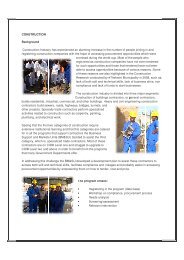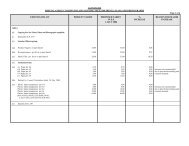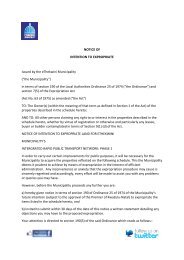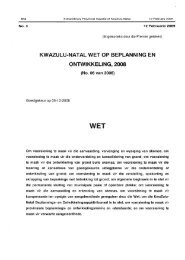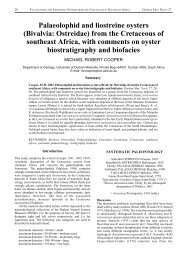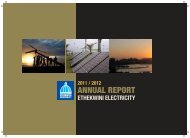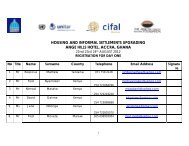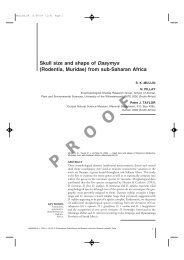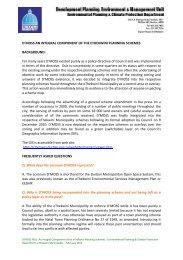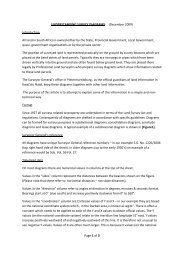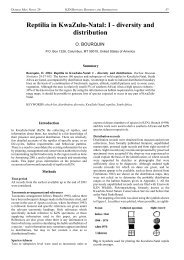Beautiful But Dangerous Poster Aliens - Durban
Beautiful But Dangerous Poster Aliens - Durban
Beautiful But Dangerous Poster Aliens - Durban
Create successful ePaper yourself
Turn your PDF publications into a flip-book with our unique Google optimized e-Paper software.
This <strong>Poster</strong>’s Objective<br />
Prevention of alien plant invasions is far<br />
cheaper than control or eradication.<br />
This poster profiles some of the most aggressive<br />
weed and invader plants in the <strong>Durban</strong><br />
Unicity area. Another poster in the series<br />
covers problem plants that are often used in<br />
horticulture.<br />
The plants on this poster were selected using<br />
these criteria:<br />
!They have or are expected to invade large<br />
parts of <strong>Durban</strong> and are likely to do so in<br />
other sub-tropical parts of South Africa.<br />
!They are potential transformers of natural<br />
habitats.<br />
Pearl Acacia (grey) and Triffid Weed (pale<br />
green) stand out on a slope dominated by weeds.<br />
Each Triffid Weed plant produces over a million<br />
seeds a year and the species is coastal KZN's<br />
worst weed.<br />
Yellow Bells tree with saplings escaping cultivation.<br />
A global survey of 1060 plant invasions<br />
found that in 59 % of the cases horticulture was<br />
the source.<br />
Control and Eradication<br />
Extent of the Problem<br />
In practice a combination of mechanical, chemical and<br />
biocontrol methods are used to combat alien plants.<br />
However, where infestations are light or cover relatively<br />
small areas, control is best achieved by mechanical<br />
means. Tackle light infestations first and then denser<br />
infestations.<br />
Small plants may be pulled out at the roots especially<br />
when the soil is moist. Larger plants may need to be<br />
dug out at the roots. The secret to success is to tackle<br />
the job in a planned way and to diligently follow-up to<br />
remove seedlings and regrowth.<br />
For more serious problems herbicides and/or biological<br />
control, using natural predators or pests, may be used. It<br />
is recommended that professional advice is sought<br />
before using these methods.<br />
Water Hyacinth covers the water at Clairwood Quarry.<br />
Water Hyacinth can double its mass every 18 days as<br />
well as produce over 5 000 long-lived seeds from each<br />
flower spike.<br />
South Africa has spent more than R 1 billion on national<br />
alien plant control and eradication programmes and is<br />
still not reducing the extent of the problem.


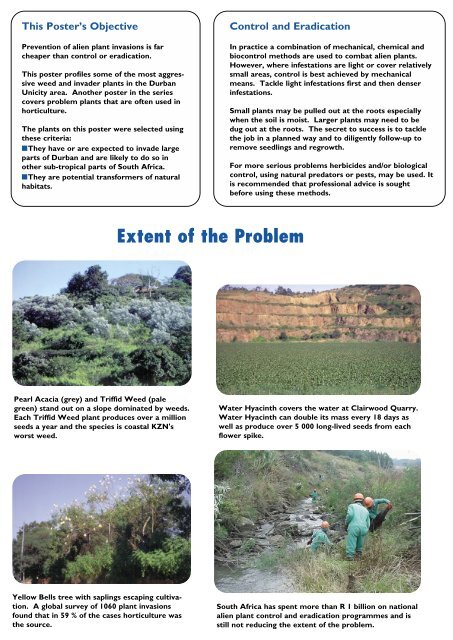
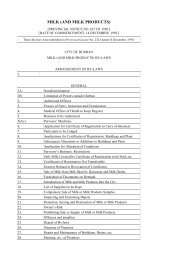
![INK Environmental Sustainability Booklet [19 MB] - Durban](https://img.yumpu.com/22025104/1/190x136/ink-environmental-sustainability-booklet-19-mb-durban.jpg?quality=85)
